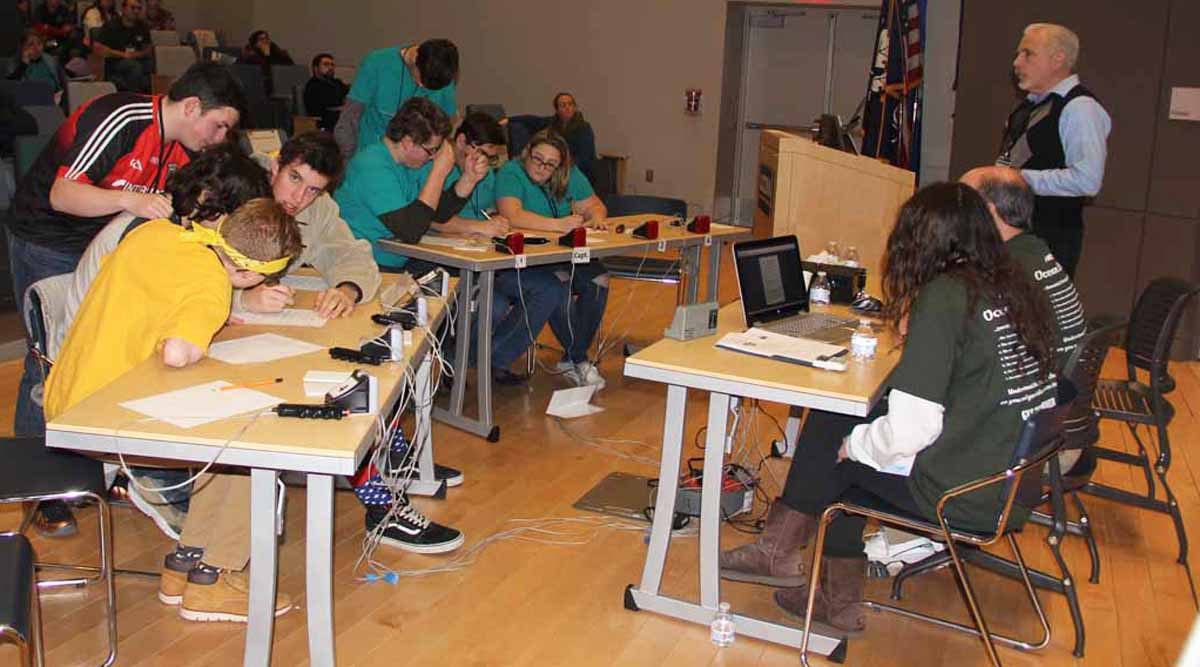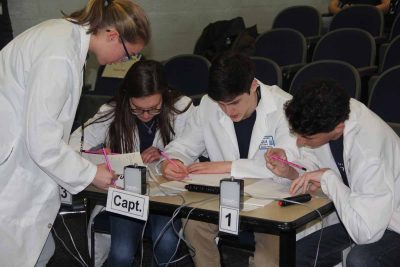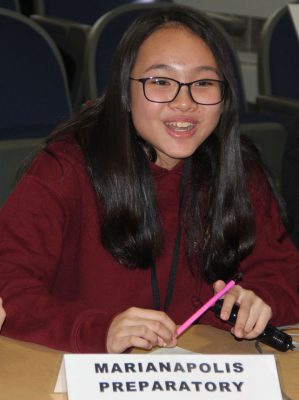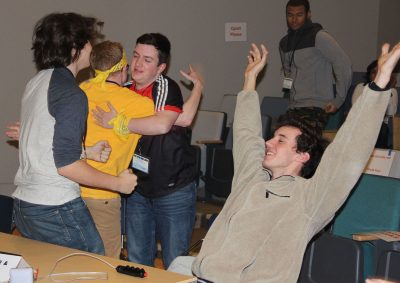
Story and photos by Judy Benson

After a day dominated by time clocks, buzzers, science judges and the powers of quick recall of all things related to the ocean, the team from the Science and Technology Magnet High School of Southeastern Connecticut gushed with unfettered joy.
“Now we’ll be able to go to the nationals and compete again,” said team Captain Alex Matthews, beaming after his team claimed the first win for the New London school in the six years it’s been competing in the annual Quahog Bowl. “It’s such a fun competition.”
All the intense mental focus required for the daylong competition against 15 other teams from Connecticut and Rhode Island gave way to hugs, high-fives and arms raised in victory for the team of Christopher Bowens, Aidan Desjardins, Derek Raymond, Michael Reilly and Matthews, coached by Charles Mulligan. School Director Laurelle Texidor was also on hand to congratulate the team, sharing high-fives with the students after the win.
“Our school has been trying for years to get here,” said Reilly.
The New London team will represent the Quahog Bowl in the national finals April 11 – 14 in Washington, D.C.
Now in its 22nd year, the Quahog Bowl is one of 24 regional competitions that are part of the National Ocean Sciences Bowl that quizzes student teams on topics across the disciplines of biology, chemistry, policy, physics and geology. The theme for this year’s contest was “Observe the Ocean; Secure the Future,” with questions focusing on how ocean observing serves society; the technologies and instrumentation used in observing; the challenges of data processing and analysis; how ocean observations influence and inform decision makers; and policies and groups relevant to ocean observation.

The competition took place on Feb. 2 at the Avery Point campus of the University of Connecticut. It is hosted and organized by Connecticut Sea Grant, led by Education Coordinator Diana Payne. More than 50 volunteers are recruited to help run the bowl, helping with check-in, reading the questions, running written answers to judges, keeping score and ensuring contest rules are followed.
“The Quahog Bowl would not happen without the unwavering dedication of some long-time volunteers and coaches,” said Payne. “The teams spend so much time preparing – it’s great to see all the hard work pay off.”
Students participating in this year’s event ranged from some who joined teams only recent to those who were veterans of past competitions. Sophia Kasem-Beg, captain of one of two Waterford High School teams, said she joined only a week before the bowl. Even though many of the questions were difficult, she said, the experience had been worthwhile.
“It’s important to challenge yourself, and it’s really important to know how much of an affect the ocean has on the world,” she said.
Throughout the contest, the atmosphere is serious yet fun, with a fast-paced structure, thought-provoking questions and a well-organized progression that generated excitement for participants and observers alike.
Ethan Pernek, a member of one of the competing teams, said the bowl helps interest students and others in learning more about marine science. He was one of the members of the team from the Bridgeport Regional Aquaculture Science & Technology Education Center, who wore lab coats – what they called their “school uniform” – through all the rounds they competed in, watched by audiences of parents, coaches, team alternates and others.

“It serves to inspire people who really don’t know much about marine science,” Pernek said.
Charles Mulligan, coach of the winning New London team, credited the students’ dedication to preparation for their success.
“To see it come together when you work with a group of kids is just overwhelming,” he said. “This group was so insanely talented, it was really a matter of steering the ship more so than lecturing information to them. They were so motivated and so hungry.”
The group met weekly to practice, but also did a lot of work on their own, he said.
“They did a lot of independent study,” Mulligan said. “These guys took a huge sense of responsibility onto themselves.”
Judy Benson is the communications coordinator at Connecticut Sea Grant.